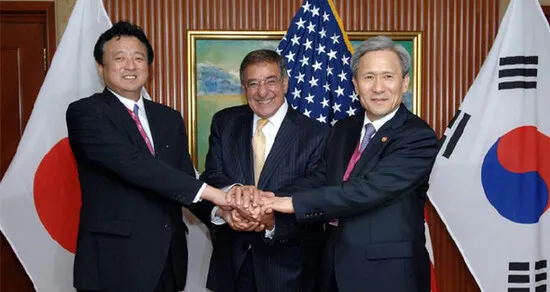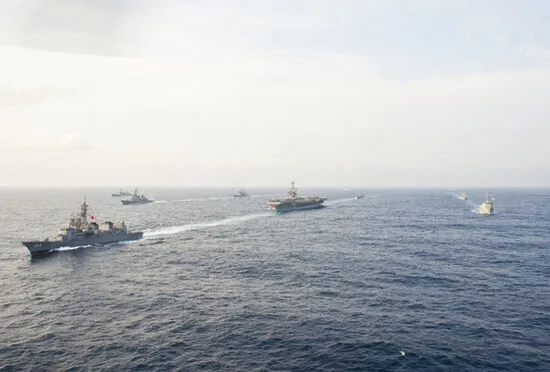hankyoreh
Links to other country sites 다른 나라 사이트 링크
Potentially landmark military pact agreed to by Korea and Japan

By Park Byong-su, Kim Kyu-won and Jeong Nam-ku, staff reporters
It emerged June 26 that the South Korean government approved a military cooperation agreement with Japan in a closed-door Cabinet meeting the previous day. A senior Ministry of Foreign Affairs and Trade official said Wednesday that the agreement had been raised before the Cabinet the previous day and voted through.
The agreement marks the first military pact between South Korea and Japan since Japan’s colonial occupation of Korea. The two countries are historical rivals with a host of unresolved historical issues.
The official added that as soon as Japan completes its own procedures, we will proceed with the agreement’s signing. The official explained that the agreement stipulated methods of exchanging intelligence and procedures for protecting and administering the intelligence that is exchanged.
“It does not require any specific intelligence exchanges or specify the content,” the official said.
The official went on to say, “For the sake of deterring North Korea and for our general security, we need to use Japan’s intelligence capabilities -- its satellites, early warning aircrafts, and antisubmarine aircrafts.”
But many reacted negatively to the agreement’s approval, which was done behind closed doors at a Cabinet meeting without the content ever being made public. The Office of the Prime Minister, which handles working-level duties for the Cabinet, explained that the item could not be made public because it came up on the spot, unlike ordinary items that are reported three days before the meeting.
A Ministry of Foreign Affairs and Trade (MOFAT) official said, “As an agreement between countries, it involved another party, so we were unable to give moment-to-moment explanations.”
Critics are charging that the passage was intentionally rushed through out of concern about a possible backlash from the public. Inje University professor Kim Yeon-chul said, “When something is as controversial and important as this, it shows a blatant disregard for democratic procedure to pass it without announcing it first, let alone seeing what the public thinks.”
“Passing it behind closed doors was a tactic admission that the agreement was too problematic to be made public,” Kim argued.
Analysts said the rushed and covert passage stemmed from a combination of pressure from Washington, demands from Tokyo, and the Lee Myung-bak administration’s foreign policy fixation with those two countries.
South Korea and Japan’s defense ministers held talks on the agreement in late May. The decision to adopt a quieter approach came amid opposition from the government and ruling party, which anticipated a negative response from the public.
Indeed, Minister of Foreign Affairs and Trade Kim Sung-hwan intimated in a May 17 meeting with Democratic United Party emergency committee chair Park Ji-won that he planned to hold off on pursuing the agreement. “We plan to make some allowances for the time of signing, given the objections coming from politicians,” Kim said at the time.
The switch to a more aggressive approach came in the space of just one month. Many observers are tracing the turnaround to the “2+2 talks” between the South Korean and US foreign and defense ministers in Washington on May 14. There, the four ministers issued a joint statement indicating that they would be beefing up the security cooperation mechanisms. While no side made explicit mention of it, analysts believe the agreement with Japan is intended to lay the groundwork for this.
Washington has repeatedly and overtly pressured Seoul to cooperate militarily with Tokyo.

A stepping-stone to further cooperation?
The South Korean government is cautioning against reading too much into the agreement, which it said, “merely stipulates the procedures for protecting and managing the intelligence exchanges that are already taking place between South Korea and Japan.”
A foreign ministry official noted that similar agreements have been signed with 24 countries, some of them former Communist states like Russia and Ukraine. “There‘s no reason we couldn’t sign one with China if that‘s what they want,” the official said.
Indeed, the agreement is known not to stipulate any obligation to share intelligence or specify the intelligence to be provided, which is to be left to the discretion of the individual country.
But many experts said the agreement, by providing a basic framework for military cooperation, could end up being a stepping stone to future efforts toward expanding the scope of military intelligence exchanges with Japan or beefing up military cooperation.
Kim Jong-dae, editor-in-chief of the military affairs journal Defense 21, noted that a military intelligence protection agreement signed with the US in 1991 necessitated an institutional framework due to changes in the intelligence shared by the two sides, including the South Korean military directly receiving military satellite intelligence from the US military.
“In saying this agreement merely institutionalizes existing intelligence exchange practices with Japan, they are doing their best to downplay its context and significance,” Kim said.
The greater context of the agreement is one of changes in the Northeast Asian security environment, including the US’s “Return to Asia” policy, a rising China, and increased military cooperation between South Korea and Japan. The abrupt approval of the military intelligence protection agreement with Japan is ostensibly about the alignment of Seoul‘s and Tokyo’s military interests in defending against North Korea, but Washington‘s Asia strategy is another factor.
Some observers said the agreement may end up provoking Beijing. There are also concerns that it may end up further entrenching the Cold War-era standoff in Northeast Asia if Pyongyang, Beijing, and Moscow decide to extend their own trilateral cooperation.
Washington’s plans for gradually shifting the focus on its national security strategy from Europe and the Middle East to Asia and the Pacific gives the approval of the agreement between South Korea and Japan the appearance of establishing a three-way military cooperation framework with the US. With it, the US is working to put the finishing touches on twin trilateral alliances in the region, one with South Korea and Japan and the other with Japan and Australia.
Washington has been expending efforts over the years to establish even loose ties of military cooperation with Seoul and Tokyo. In 2009, it used the hard-line mood after North Korea’s April rocket launch and May nuclear test to organize the first-ever trilateral defense ministers’ talks with South Korea and Japan in Singapore in late May of that year.
Long-standing dream of a trilateral alliance
Under the MB administration, South Korean military cooperation with Japan has been increased within the trilateral framework with the US. Joint military exercises with the US in the East Sea were observed for the first time ever by a Japanese Self-Defense Forces (JSDF) officer in July 2010. The following October, a JSDF vessel took part in exercises in the waters near Busan. That December, officers in the South Korean military observed joint military exercises between the US and Japan. This past June 21 and 22 saw large-scale marine exercises between the three country‘s militaries, including a US aircraft carrier.
In addition to the check on China that stronger cooperation with South Korea and the US would provide, Japan’s proactive approach also appears to indicate intentions to intervene in the event of an emergency on the Korean Peninsula. In December 2010, then-prime minister Naoto Kan said discussions were under way on a plan for dispatching the JSDF to rescue Japanese residents of South Korea if an emergency occurs.
“My understanding is that South Korean and Japanese defense authorities agreed in February 2011 on the goal of developing long-term guidelines for military cooperation through summit meetings between their defense ministers,” Kim Jong-dae said. “This intelligence protection agreement is understood to be the first step in that process.”
Peace Network representative Cheong Wook-sik said, “After fifty years, the US-Japan alliance has the opportunity to realize its longstanding dream of building a trilateral alliance through this South Korea-Japan agreement, but there are greater concerns now that South Korea will wind up being pulled into Washington’s new military strategy.”
Please direct questions or comments to [english@hani.co.kr]

Editorial・opinion
![[Guest essay] True resolution of the ‘comfort women’ issue, as both victim and perpetrator state [Guest essay] True resolution of the ‘comfort women’ issue, as both victim and perpetrator state](https://flexible.img.hani.co.kr/flexible/normal/500/300/imgdb/original/2025/0821/7017557644052189.jpg) [Guest essay] True resolution of the ‘comfort women’ issue, as both victim and perpetrator state
[Guest essay] True resolution of the ‘comfort women’ issue, as both victim and perpetrator state![[Editorial] Inquiry must clarify if gov’t pressure led to unfair Westinghouse settlement [Editorial] Inquiry must clarify if gov’t pressure led to unfair Westinghouse settlement](https://flexible.img.hani.co.kr/flexible/normal/500/300/imgdb/original/2025/0820/5317556787190915.jpg) [Editorial] Inquiry must clarify if gov’t pressure led to unfair Westinghouse settlement
[Editorial] Inquiry must clarify if gov’t pressure led to unfair Westinghouse settlement- [Column] Does ‘KPop Demon Hunters’ count as Korean? Does it matter?
- [Editorial] Trump and Putin’s Ukraine deal is a warning to countries like Korea
- [Editorial] ‘Two-track’ approach with Japan does not mean disregarding past
- [Editorial] Lee’s gestures toward North Korea, Japan are a welcome step
- [Editorial] Korea-Japan summit must acknowledge past while looking to future
- [Column] Abandon all hope, you who enter radical politics
- [Column] Can Korea say ‘no’ to the US?
- [Column] Why Yoon is cosplaying as a prisoner of conscience
Most viewed articles
- 1[Column] Does ‘KPop Demon Hunters’ count as Korean? Does it matter?
- 2[Interview] Andy Kim says dialogue must precede decisions about US troops in Korea
- 3[Guest essay] True resolution of the ‘comfort women’ issue, as both victim and perpetrator state
- 4Korean firms set to hand Trump around $150 billion in direct investment in US
- 5North Korea rebuffs Lee’s overtures, says Seoul ‘cannot be a diplomatic partner’
- 6National Assembly speaker invited to China’s V-J Day celebration
- 7Trump could demand a massive stake in Samsung Electronics for chip grants
- 8Presidential office orders probe into KHNP’s 50-year ‘slave contract’ with Westinghouse
- 9South Korea seeks to revise nuclear energy pact with US, eyeing enrichment and reprocessing
- 10Sex, screen and sports: How Chun Doo-hwan’s plan to distract the public backfired